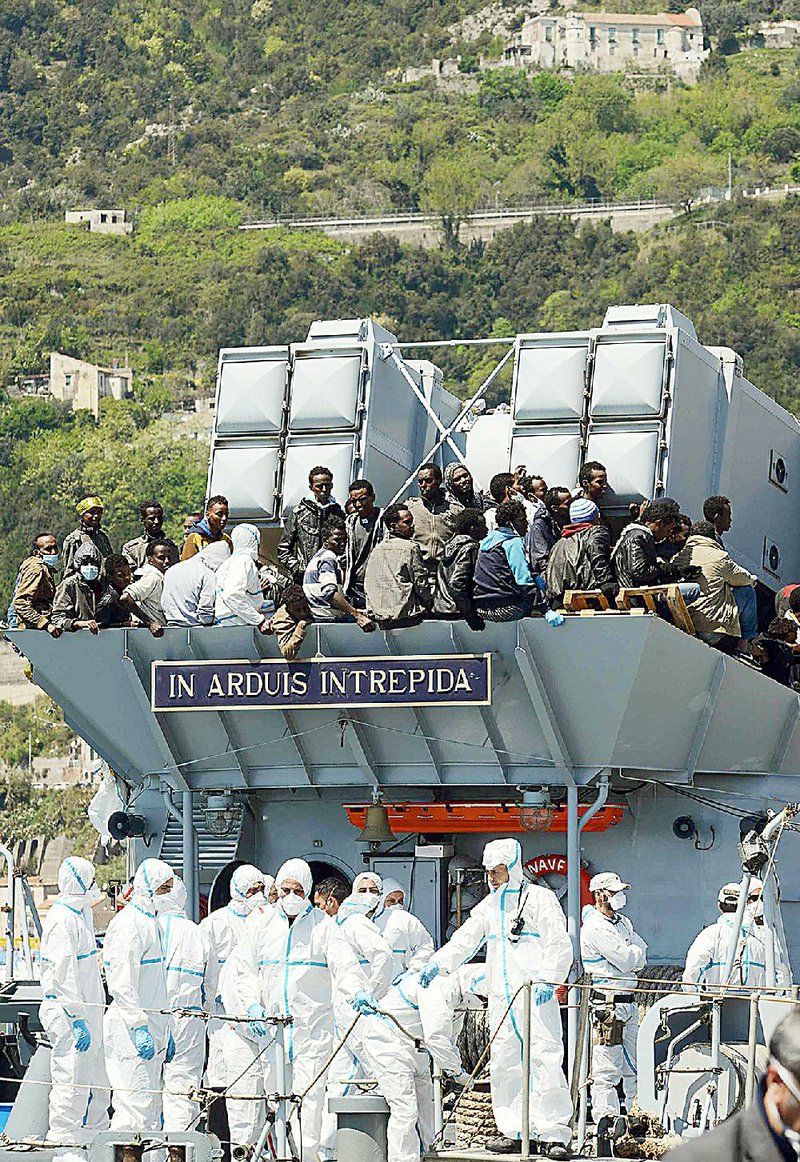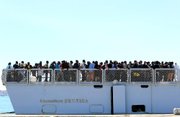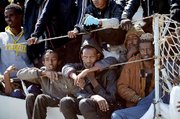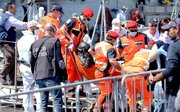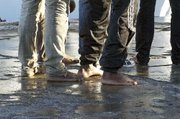ROME -- Italy pressed the European Union on Wednesday to devise robust steps to stop the tide of people trying to cross the Mediterranean, including considering military intervention against smugglers and boosting United Nations refugee offices in countries bordering Libya.
"We know where the smugglers keep their boats, where they gather," said Defense Minister Roberta Pinotti. "The plans for military intervention are there."
Thousands of people fleeing conflicts or poverty in the Middle East and Africa head to Italy each year on smugglers' boats. Some 90 percent of the boats leave from Libya, where the lack of a central authority and an insurgency by extremists affiliated with the Islamic State group have contributed to chaos and lawlessness, allowing criminal trafficking networks to proliferate.
Pinotti said Italy was willing to take the helm of any military intervention as long as it is carried out as an international mission, backed by the United Nations.
"We're ready to do our share," she told Sky TG24. "We're the closest country to Libya."
Pinotti spoke a day before EU leaders hold an emergency meeting in Brussels called after a shipwreck off Libya last weekend that killed more than 800 people, according to witnesses. It would be the highest known loss of lives in a single case in the Mediterranean.
Ahead of the meeting, Premier Mario Renzi called for EU leaders to approve three key proposals: doubling the resources and assets of the current EU border patrol mission; destroying smugglers' boats and improving coordination across the EU for transferring asylum seekers.
"European Union naval operations in the Horn of Africa have successfully fought piracy -- and a similar initiative must be developed to effectively fight against human trafficking in the Mediterranean," Renzi wrote in a New York Times opinion piece. "Trafficking vessels should be put out of operation."
In Italy on Wednesday, a naval vessel docked in the Sicilian port of Augusta with 446 people who had been rescued off the southern coast of the Italian mainland. The navy said 59 were children.
"We prefer to die trying [to cross the Mediterranean] than stay back there and die," said Emmanual, a Nigerian who recently arrived in Sicily. "Stay at home and get shot dead or maybe burnt to death, I just prefer to die while trying or survive."
Later in the day, another 540 foreigners arrived in Salerno on the mainland. Some were in isolation on the Italian navy ship that rescued them since they had scabies, a contagious skin condition caused by a tiny, burrowing mite.
The growing health threat prompted Italian Health Minister Beatrice Lorenzin to convene a meeting of EU health ministers in Rome on Wednesday to coordinate immunization and other health measures for the new arrivals.
Pinotti said she was cautiously hopeful that the EU summit today, solicited by Italy, would take tangible steps to deal with the emergency.
"We think it's the moment in which Europe decides, forcefully, to have an international police operation, which will undo this band of criminals," Pinotti said of the smugglers.
In a speech to Parliament, Renzi urged the EU to swiftly craft long-range, comprehensive policy on the people fleeing to Europe.
"When a person has to risk his life because he needs to escape from a situation where they are chopping off the heads of those near him, you cannot discourage departures with a generic statement," the premier said. "You can do it by putting the [U.N.] High Commissioner for Refugees in Niger, Sudan" and elsewhere in Africa.
Italian media reports this week said government officials were considering proposing the setting up of camps, under U.N. auspices, in Niger, Tunisia and Sudan, so applications for refugee status could be examined there before the people attempt to go to Europe.
Renzi didn't specify whether such camps would be an option, but pushed for the involvement of U.N. refugee offices in countries near Libya.
Since Italy is the first EU country where those crossing the sea from Libyan ports set foot, they stay in reception centers in the country, sometimes for years, while their requests or appeals for asylum are processed. Those deemed ineligible for asylum are ordered expelled, but many slip away and head to northern Europe to reach relatives.
Pinotti indicated that if requests for asylum were processed in Africa, all EU countries could take a share of the people found eligible for refugee status or asylum.
She urged "sharing and co-responsibility," saying the people "all can't arrive in Italy."
Italy has saved about 200,000 lives at sea since the start of 2014. But Renzi said Italy's "noble, generous reaction alone isn't enough."
"We are asking Europe to be Europe, not just when it's time to devise a budget," Renzi said.
Renzi called for the European Union to have a more coordinated strategy, including expanding sea patrols and taking action against smugglers in Libya and elsewhere, whom he referred to as "21st-century slave drivers." He also called for a robust presence of "international organizations" in the southern part of Libya.
Pinotti warned that the flow of people isn't about to stop, saying "90 percent are from Nigeria, Ethiopia, Somalia, from places where they are afraid of dying. We cannot stop them" from leaving their homelands.
Mohammed Cisse, a recent arrival from Gambia, said he and his "blood brothers" had little choice but to leave.
"We are all from the same Africa, we are risking our lives to cross the sea to come to Europe," he said in Clatagirone, Sicily. "It's very painful, we are dying at sea."
EU asked to double efforts
Today, European leaders are expected to discuss proposals to double the size of search-and-rescue operations in the Mediterranean; increase the budget for Frontex, the European Union's border agency; improve cooperation between the police across the bloc; and intensify the battle against smugglers and human traffickers.
EU officials said Wednesday that the current budget for the bloc's border protection operation, known as Triton, was about $3.2 million a month, and that the operation's resources included two aircraft, two helicopters, six coastal patrol vessels and about 65 officers.
Even doubling that would probably not be enough to deal with the scale of the current crisis, analysts said.
The number of people who have died in the Mediterranean Sea this year is thought to have already reached 1,776, according to the U.N. refugee agency. That number is more than 30 times the death toll at this time last year, the International Organization for Migration said.
However, efforts to forge a common and robust European approach to immigration have faced several challenges in recent years, including the fact that migration policy in the 28-member union is mostly the preserve of national governments rather than Brussels.
The efforts to forge a new European strategy on immigration also have been stymied by weak political will at a time when budgets are stretched and far-right parties have gained in popularity by tapping into resentment against foreigners.
Dutch anti-Islam opposition lawmaker Geert Wilders on Wednesday copied part of Australia's approach to stopping a similar influx of foreigners by making a video telling those considering crossing from North Africa to Europe: "You will not make the Netherlands home."
The video, posted on Wilders' website, echoes a similar message recorded by the Australian government last year that warned would-be asylum seekers: "Anyone who travels illegally by boat will not make Australia home."
In Wilders' video, which could be seen on his Freedom Party's website on Wednesday, he says in English: "No way."
Wilders, whose popularity in the Netherlands is based mainly on his tough anti-Islam, anti-immigration rhetoric, then switches to speaking in Dutch to call for EU navy patrols to send back all foreigners they intercept and not transport them to Europe.
Elsewhere on Wednesday, Turkish President Recep Tayyip Erdogan condemned what he said were suggestions in Europe to sink human traffickers' vessels, insisting the plans would leave people "to their deaths."
Combating the traffickers by arresting ringleaders and destroying their boats has emerged as a proposal to be discussed at the EU meeting today, although no one has mentioned targeting boats with people onboard.
But Erdogan, speaking at a joint news conference with visiting Iraqi President Fuad Masum, suggested that the European plans could pave the way for ships being sunk while carrying people.
He didn't specify how, but spoke of "statements coming from Europe preparing the ground for [vessels] to be sunk in the Mediterranean, in the Aegean, while transporting migrants and refugees."
The Turkish leader also criticized European countries' efforts to stop foreigners from reaching their borders, saying Turkey is hosting 1.7 million people from Syria and another 300,000 from Iraq because it considered it to be its "humanitarian duty."
"If for one reason or the other these people are fleeing their countries to seek refuge in European countries, what kind of an approach is it to sink the ships they are fleeing on? How can they adopt an approach that leaves the migrants to their deaths?" Erdogan asked. "I condemn and curse the West's attitude."
Information for this article was contributed by Frances D'Emilio, Mike Corder and Lorne Cook of The Associated Press and by Dan Bilefsky and Jim Yardley of The New York Times.
A Section on 04/23/2015
